Kpop Winter Fashion Korean Drama Funny Quotes
Looking for inspiration from some Korean sayings, Korean Proverbs, and famous Korean Quotes? You've come to the right place!

Ancestors have passed down their wisdom in Korea for centuries through their traditional Korean proverbs and sayings.
Along with beliefs, practices, and traditions, these Korean Quotes are already part of Korean Culture. Not only do they contain wisdom, but it's a fun way to get immersed in Korean culture as well. You may even hear them in your favorite Korean films, dramas, or songs.
Here is a list of the most common Korean proverbs. The English Translations will be discussed later.
- 제 눈에 안경이다 (je nune angyeongida)
- 꿩 먹고 알 먹는다 (kkwong meokgo al meongneunda)
- 로마는 하루아침에 이루어진 것이 아니다 (romaneun haruachime irueojin geosi anida)
- 보기 좋은 떡이 먹기도 좋다 (bogi joeun tteogi meokgido jota)
- 과부 설움은 홀아비가 안다 (gwabu seorumeun horabiga anda)
- 낮말은 새가 듣고 밤말은 쥐가 듣는다 (nanmareun saega deutgo bammareun jwiga deunneunda)
- 눈에서 멀어지면, 마음에서도 멀어진다 (nuneseo meoreojimyeon, maeumeseodo meoreojinda)
- 말을 냇가에 끌고 갈 수는 있어도 억지로 물을 먹일 수는 없다 (mareul naetgae kkeulgo gal suneun isseodo eokjiro mureul meogil suneun eopda)
- 백지장도 맞들면 낫다 (baekjijangdo matdeulmyeon natda)
- 궁하면 통한다 (gunghamyeon tonghanda)
Below on this page, we've listed 55 popular proverbs, their meanings, and audio so you can listen and practice speaking. There are funny Korean quotes, there are inspirational Korean quotes and there are quotes that will make you think hard. Read on to learn all about them!
Do you want to take these along with you? We put the 20 most famous proverbs from this page and their explanations in a downloadable PDF that you can take on the go:
On this page, you'll find some useful proverbs and sayings that you'll be able to make use of in your everyday life. You might hear them from Koreans or use them the next time you're in Korea.
Below is the list of proverbs, along with the meanings and translations. After the proverbs, there is a list of popular Korean idioms and sayings. Click on the blue text next to the yellow speaker icon to hear the pronunciation.
For now, let's sit back, take a deep breath, and get ready to be enlightened!
Korean Proverbs
Below each of the proverbs, we give the literal meaning and the English translation. We explain the meaning along with examples of situations where you might want to use them. Sometimes the literal English translation of the proverbs isn't clear, so that's why we also explain what it means so you can easily understand.
In cases where there is a similar expression in English, you'll see that we've translated it into its Western equivalent. The literal English translations are also included, so you can also use them in your Korean study.
We also give the proverbs in the 한글 (Hangeul), the Korean alphabet. It's best to know how to read the Korean alphabet before diving into phrases like these. If you want to learn Korean, learning the alphabet is the first step. It's super easy to learn, so give it a try!
Get Korean Proverbs Free PDF
1.
Meaning: Beauty is in the eye of the beholder
Literal Translation: Glasses in my eyes

When to use it: You might use this Korean proverb when you have a friend that sees someone else as attractive, but you disagree.
Do you see the beauty in something/someone that is not traditionally attractive and others can't see it? Use this Korean proverb to suggest that the glasses we see with are all different.
2.
Meaning: Kill 2 birds with 1 stone
Literal Translation: If you eat a pheasant, you also eat the egg
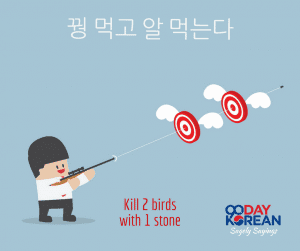
When to use it: Use this Korean proverb to describe a situation where you do one action and receive two benefits at the same time. For example, let's say you have to clean the outside of your house. While cleaning, you also find money on the ground. You got two benefits (clean house and money) from one action.
3.
Meaning: Rome wasn't built in a day
Literal Translation: Rome wasn't made in one morning
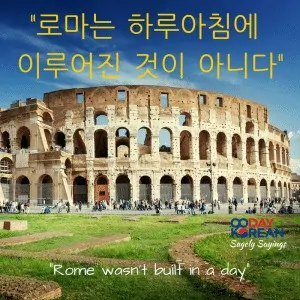
When to use it: Like in English, this Korean proverb reminds someone that you cannot expect to do important tasks really quickly and that quality work takes time. For example, if you're working on a project for your department, it'll take you sleepless nights to get something done. You can also use this proverb for your favorite K-pop idol or group. They trained for years to get the fame they have now.
Get Korean Proverbs Free PDF
4.
Meaning:What looks good tastes good
Literal Translation: Good looking tteok (rice cake) tastes good

When to use it: When you see something that looks good, it likely will be of good quality. That's because someone put effort into it to make it have a good appearance.
For example, when a chef makes a dish that looks delicious, and you assume it will be delicious, then you could use this Korean proverb.
5.
Meaning: Misery loves company
Literal Translation: A widower knows a widow's sorrow

When to use it: You can use this Korean proverb to express the idea that unhappy people like to express their emotions to others or are comforted by the unhappiness of others. An example could be a student who gets detention who tries to get others in trouble, so they don't need to serve it alone!
You can also use this proverb for people who love to gossip or use harsh words or language towards others. They find happiness or enjoyment talking about the unfortunate events in other people's lives.
6.
Meaning:The walls have ears
Literal Translation: Birds hear the words spoken in the day, and mice hear the words spoken at night
When to use it: People are social beings, and one culture that we all have is we communicate with each other. And if you know someone who spreads rumors or talks poorly of others, you should step in and say this Korean proverb.
7.

Meaning: Out of sight, out of mind
Literal Translation: If it becomes distant from your eyes, it also becomes distant from your mind (heart)
When to use it:To express the idea that when one cannot see someone or something, it is easy to forget them or forget about that thing, for example, you can use this proverb if you have a book that you kept inside a cabinet that you don't often open, you'll eventually forget that you have that book.
People could also use this Korean proverb to describe a couple having trouble in a long-distance relationship. For Koreans, having a long-distance relationship can be very challenging. If they can't meet each other often, they'll eventually drift apart.
8.
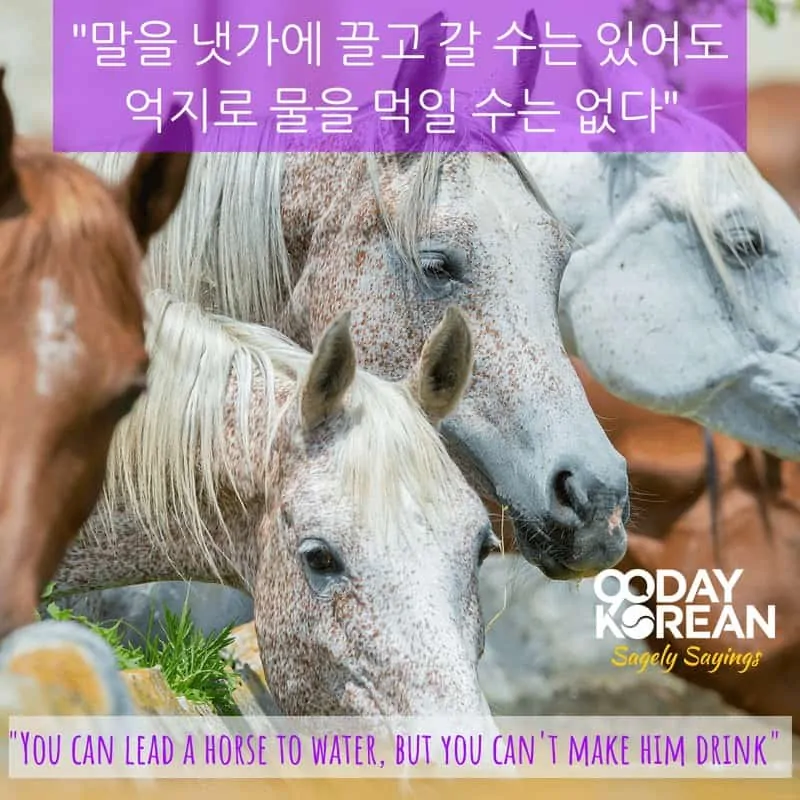
Meaning: You can lead a horse to water, but you can't make him drink
Literal Translation: You can lead a horse and go to a stream, but you can't make it drink water through its own will
When to use it: You can use this Korean proverb to express the idea that you can make it easy for someone to do something, but you can't force them to do it. This proverb may be used by two mothers talking about their sons and how they can't get them to do homework.
Get Korean Proverbs Free PDF
9.

Meaning: Two heads are better than one
Literal Translation: If you lift together, it's better – even if it's a sheet of paper
When to use it:This is a great Korean proverb to express the idea that it is always best to work together on a task, no matter how easy it may seem. For example, a Korean student could use this expression when they meet a study partner. You can best use this proverb among people working for a company. It can be a good culture to adopt when working on small or big projects.
10.
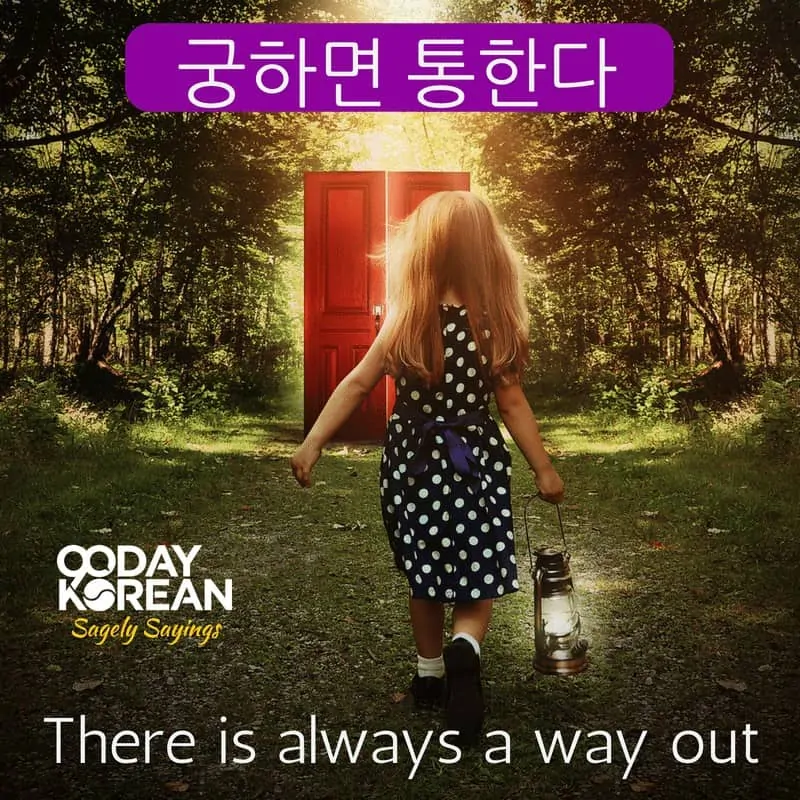
Meaning: There is always a way out
Literal Translation: If you are hard up for something, it will open up
When to use it: In the Korean language, this proverb is often used to explain motivations for coming up with an innovative solution to a problem, like a man who starts selling his paintings on the street after he loses his job and replaces his income.
11.

Meaning: Where there's a will, there's a way
Literal Translation: In the place, there is a will, there is a way
When to use it: This Korean proverb is used to describe situations where one is determined and finds a way to achieve their aims, even if they are difficult. It could be used in a speech or to describe a situation where someone needs to be encouraged to take on a great feat.
12.
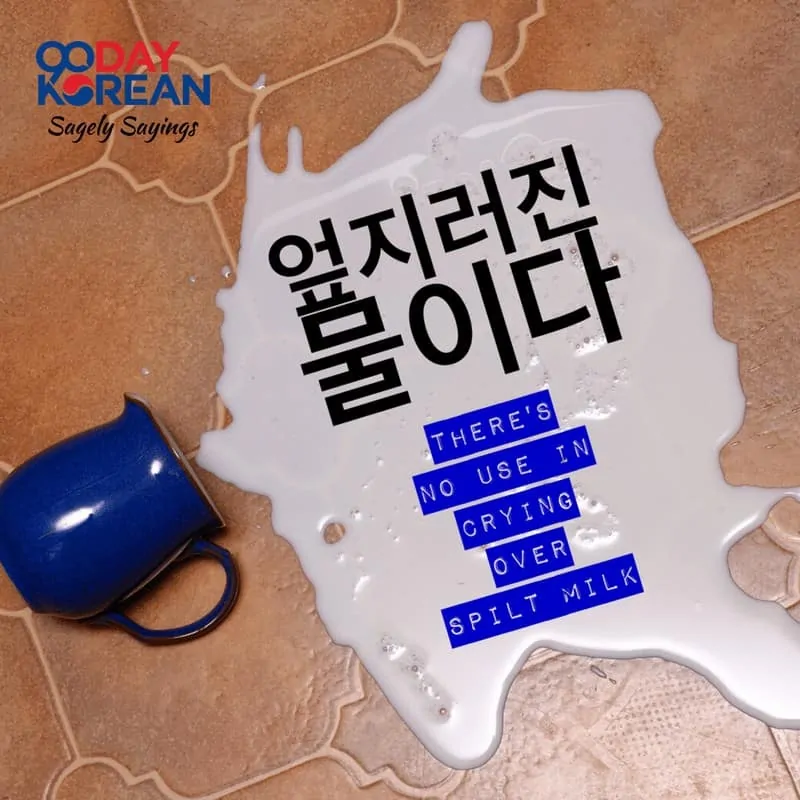
Meaning:There is no use in crying over spilled milk
Literal Translation: It is spilled water
When to use it: The water is already spilled, so there is no use in making a big deal about it. Use this Korean proverb to express that there is nothing you can do about it.
Get Korean Proverbs Free PDF
13.
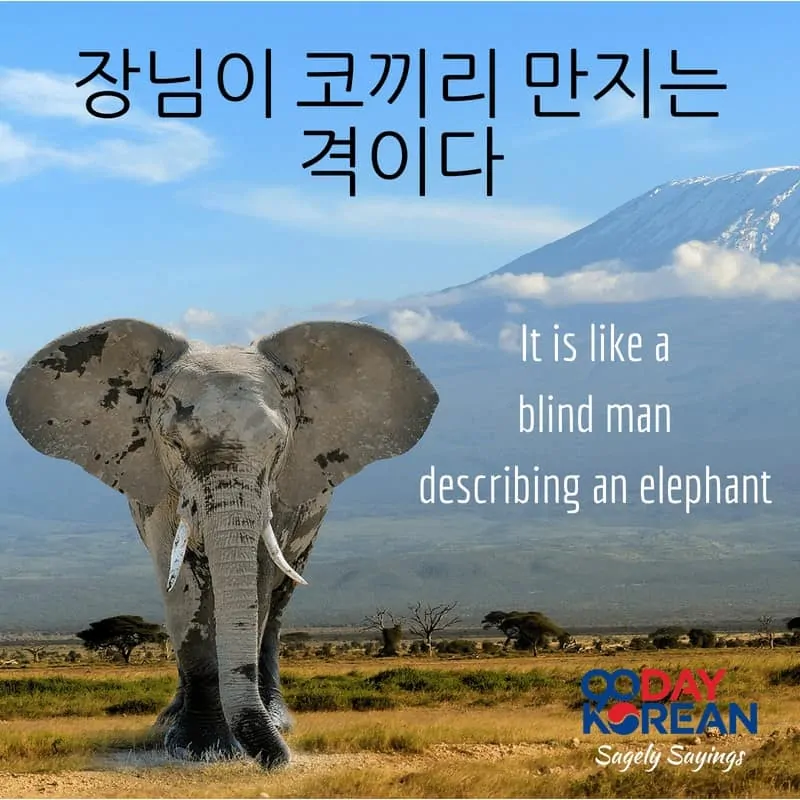
Meaning: It is like a blind man describing an elephant
Literal Translation:It is like a blind man touching an elephant.
When to use it: If a blind man is touching an elephant, he likely can't describe how large it is just by touching it. Use this Korean proverb if someone is acting like an expert, but that person only knows a small amount about the subject.
14.
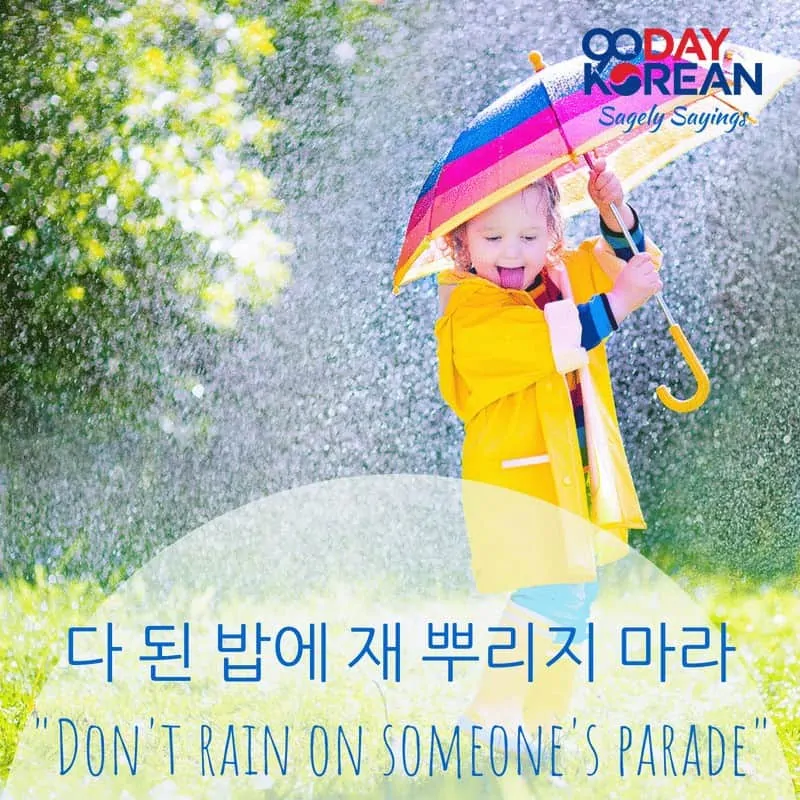
Meaning: Don't rain on someone's parade
Literal Translation: Don't spread ashes on cooked rice
When to use it: Use this Korean proverb to command someone not to spoil another's plans or ruin a moment, like delivering bad news at a wedding.
Get Korean Proverbs Free PDF
Korean Quotes
Here are some popular Korean Quotes that you've probably heard in a Korean Drama or Korean Movie.
1.

Meaning: Laughter is the best medicine
Literal Translation: Laughter is the best healer
When to use it: You can use this Korean quote to suggest that trying to be happy or thinking happy thoughts will help you overcome worry or depression. For example, you could suggest this expression to a friend after they break up with their boyfriend.
2.
Meaning: To make trouble and then give help
Literal Translation: Give a disease, then give medicine
When to use it: This Korean proverb is used someone helps after causing trouble. You could use this in the case where someone gives an insult, then kind words after. For example, 'your style isn't great, but I love your personality.' Or, someone says insulting words to you but then offers to buy you lunch.
3.
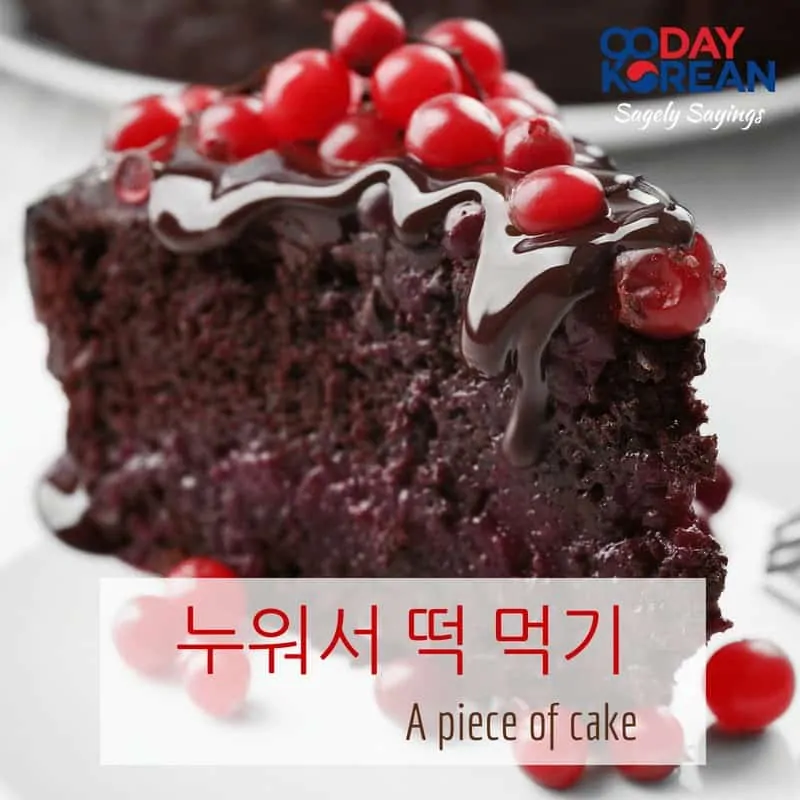
Meaning: A piece of cake
Literal Translation: Eat tteok while lying down
When to use it: This is a great Korean quote to express how easy something is. For example, imagine your best friend is a chef, and he makes you dinner. You say it's delicious, and he says '누워서 떡 먹기야 (nuwoseo tteok meokgiya),' meaning it was as easy to cook as 'lying down and eating tteok.'
4.

Meaning: Genius shows itself from an early age
Literal Translation: You can know a promising tree from when it's a baby tree
When to use it: Use this Korean quote to describe a person with a bright future from an early age. You can apply it to a smart child who you think will grow up to be a brilliant adult. Or, say it about a child who is great at basketball and you think will be a basketball star later in life.
5.
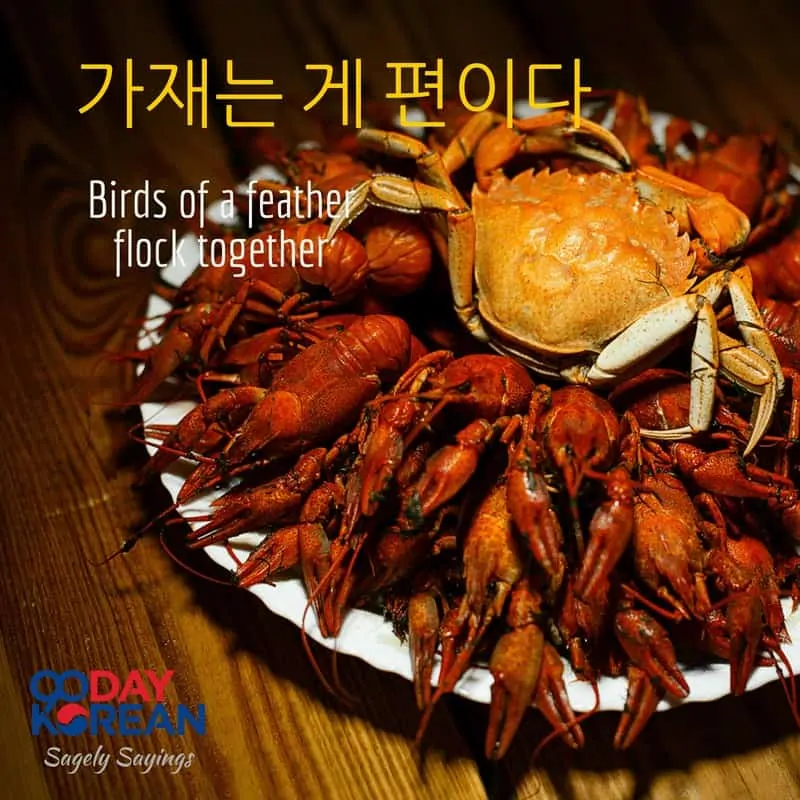
Meaning: Birds of a feather flock together
Literal Translation: The crayfish sides with the crab
When to use it:Since a crayfish and a crab have many similar traits, this saying implies that they would side with each other. Use this Korean proverb to describe how similar characters, appearances, or backgrounds tend to stick together.
6.

Meaning: Even a monkey sometimes falls from the tree
Literal Translation: There is a time when even monkeys fall from a trees
When to use it:Use this Korean quote to suggest thateven experts sometimes make mistakes. Monkeys are great climbers but sometimes fall. If a friend is really beating themself up over a mistake, use this expression to suggest that mistakes happen.
7.

Meaning:The parish priest forgets that he was once a parish clerk
Literal Translation: The frog can't remember the times when he was a tadpole
When to use it: There may be times when a professional or experienced person thinks highly of him or herself. He or she can't relate to beginners, even though that's where he or she started.
Imagine that you're a great dancer, and you keep bragging to your best friend, who is a novice. Then your mom enters the room and says the Korean proverb '개구리 올챙이 적 생각도 못 한다 (gaeguri olchaengi jeok saenggakdo mot handa)' about you.
8.
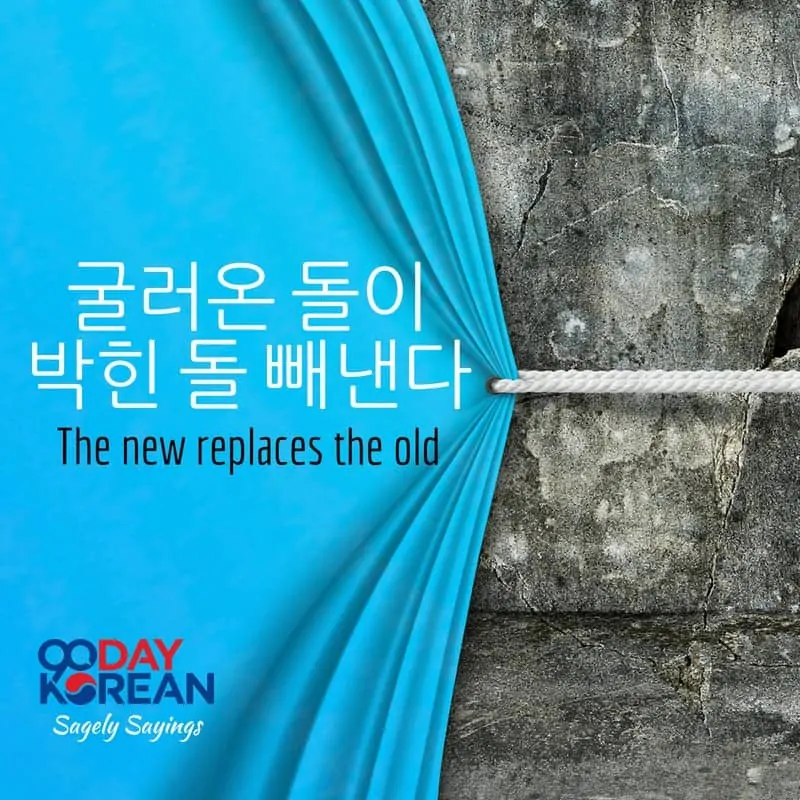
Meaning: The new replaces the old
Literal Translation: A rolling stone extracts a stone that is embedded.
When to use it: Let's say that you're the manager for your team at work, but you're doing mediocre work at your job. A newcomer joins your team, does a great job, and soon becomes the new manager. The president of the company then pops in and says this Korean proverb about the rolling stone.
Get Korean Proverbs Free PDF
9.

Meaning:Better to ask the way than to go astray
Literal Translation: Ask first, then go, even if it's a road you know
When to use it: This Korean quote is great for situations when someone should be careful and work hard on a task, regardless of its significance. Let's say your brother is taking the Japanese proficiency test and knows Japanese really well. He is confident, so he thinks he doesn't have to study. Use '아는 길도 물어가라 (aneun gildo mureogara)' to motivate him to prepare and ensure success properly!
10.

Meaning:Clothes make the man
Literal Translation: Clothes are your wings
When to use it: Use this Korean quote to emphasize the importance of dressing well. If you find yourself in a situation where you need to say 'dress well,' remember this Korean proverb. It means the same thing as the English expression "Clothes make the man."
Can't read Korean yet? Click here to learn for free in about 60 minutes!
11.

Meaning:A pie in the sky
Literal Translation: A picture of tteok (rice cake)
When to use it: Imagine that you're heading to the department store while you're reading this Korean proverb. Your friend spots an amazing bag, and she wants to buy it. It's 8x her monthly salary, so she can't afford to buy it. You chime in with '그림의 떡이야 (geurimui tteogiya)'.
12.

Meaning:One good turn deserves another
Literal Translation: If going words are beautiful, coming words will be beautiful
When to use it: Use this Korean quote to encourage people to talk nicely about others. For example, if your friend is talking poorly about another friend, you can say '가는 말이 고와야오는 말이 곱다 (ganeun mari gowayaoneun mari gopda).' If your friend talks nicely about others, then good things will come back his or her way!
Get Korean Proverbs Free PDF
13.

Meaning:Bad timing
Literal Translation: Going day is the fair day
When to use it: This proverb means bad timing, so you could use it to express that your timing for something wasn't good.
Imagine you go to your favorite brunch restaurant with your family. As you approach the door, there is a sign on the door that says 'Closed for Children's Day. In that case, you can use this Korean proverb: '가는 날이 장날 (ganeun nari jangnal).'
14.

Meaning:It's often difficult to see what is right in front of you
Literal Translation: The bottom of the lamp is dark
When to use it: This is a great Korean proverb that you can use to talk about things you overlook. An example would be if you are criticizing your neighbor for not shoveling the snow off of his doorstep, but your doorstep needs shoveling as well. It means that you should pay attention to things in front of you.
15.

Meaning:Don't try to teach a fish how to swim
Literal Translation: Write hanja in front of Confucius (Hanja is the Korean name of the traditional writing system consisting mainly of Traditional Chinese characters)
When to use it: You can say this proverb to someone so arrogant that they are trying to teach an expert how to do something. For example, this would be good to say if someone was trying to teach 김연아 (Yuna Kim | A South Korean former competitive figure skater) how to ice skate. '공자 앞에서 문자 쓴다 (gongja apeseo munja sseunda)!'
Korean Idioms
1.

Meaning: You automatically learn what you expose yourself to
Literal Translation: A school dog recites a poem after three years
2.
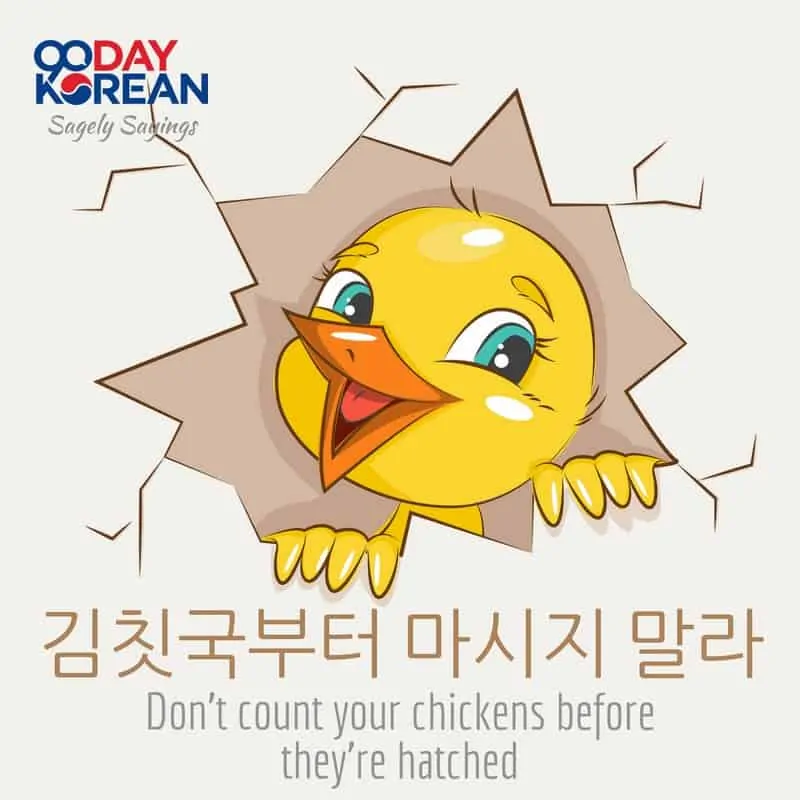
Meaning:Don't count your chickens before they're hatched
Literal Translation: Don't drink the kimchi soup first
When to use it: Let's say your friend is buying something, such as a new car. She is deciding between a standard car and a more expensive car. If she is counting on a raise at work to pay for the more expensive car, you can use this Korean proverb.
The meaning is that you should wait until what you expect to happen actually happens. Kimchi soup is eaten after food to improve digestion. Therefore, you should wait for your main meal to come before eating the soup.
3.
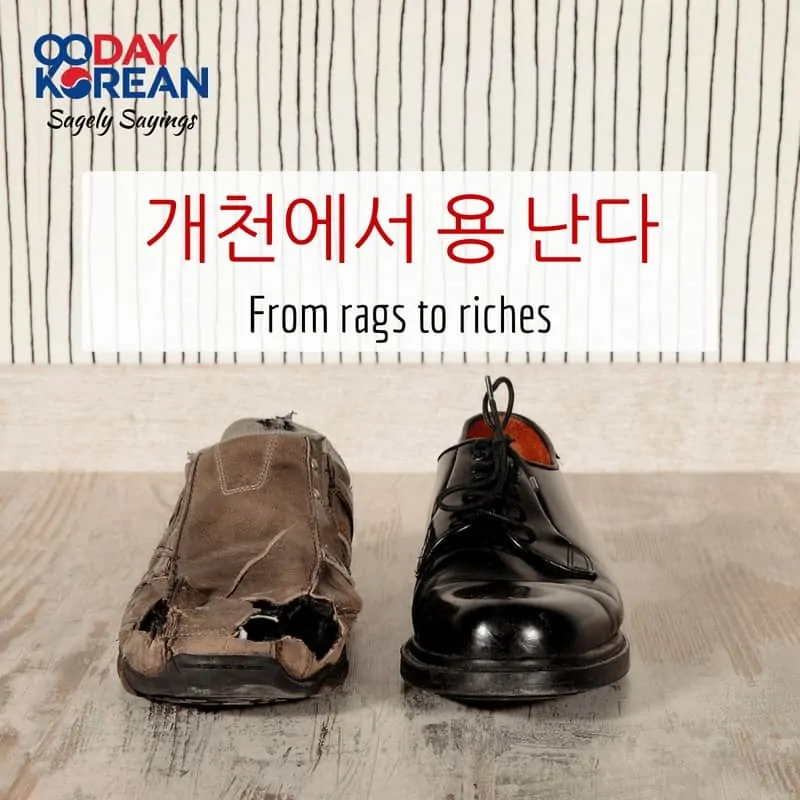
Meaning: From rags to riches
Literal Translation: From the stream, a dragon rises
4.
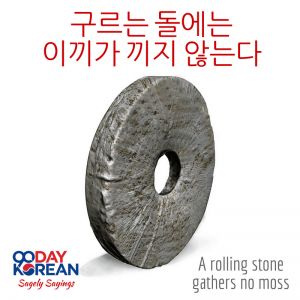
Meaning: A rolling stone gathers no moss
Literal Translation: A rolling stone gathers no moss
5.

Meaning: Empty vessels make the most sound
Literal Translation: An empty cart rattles loudly
6.
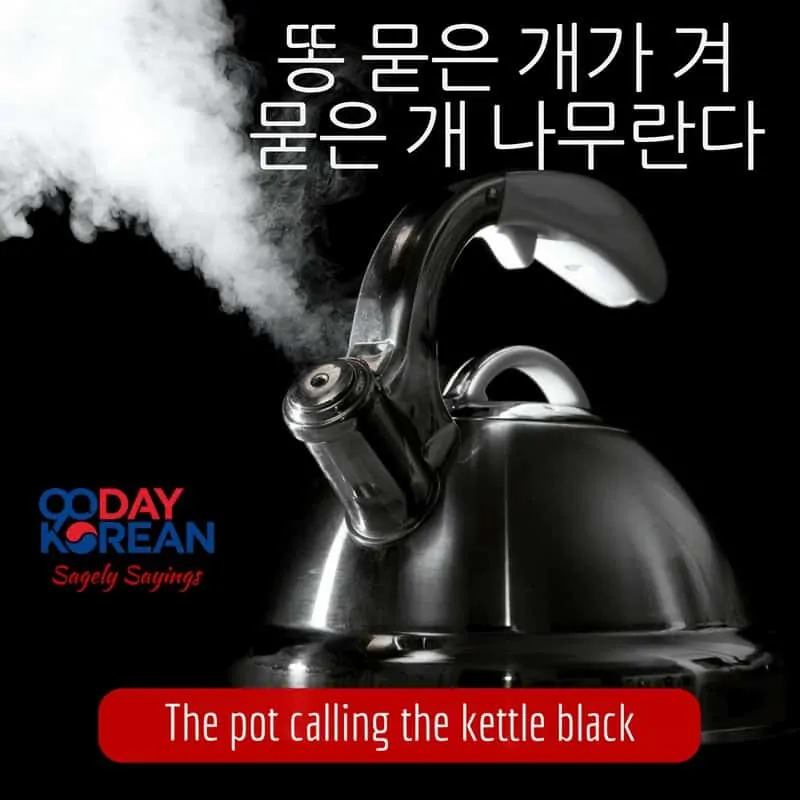
Meaning: The pot calling the kettle black
Literal Translation: The dog covered with dung scolds the dog with the chaff.
7.

Meaning: Well begun is half done.
Literal Translation: The start is the half
When to use it: This is a popular Korean proverb. It means that just getting started at all is something significant.
This is one of the proverbs you could use with a friend who is starting something new but is unsure of the direction. For example, maybe your friend is learning Korean, and you want to applaud her for doing so. Use these simple words to give your friend some support!
8.

Meaning: A loaf of bread is better than the song of many birds
Literal Translation: First eat, then see Geumgang Mountain
9.
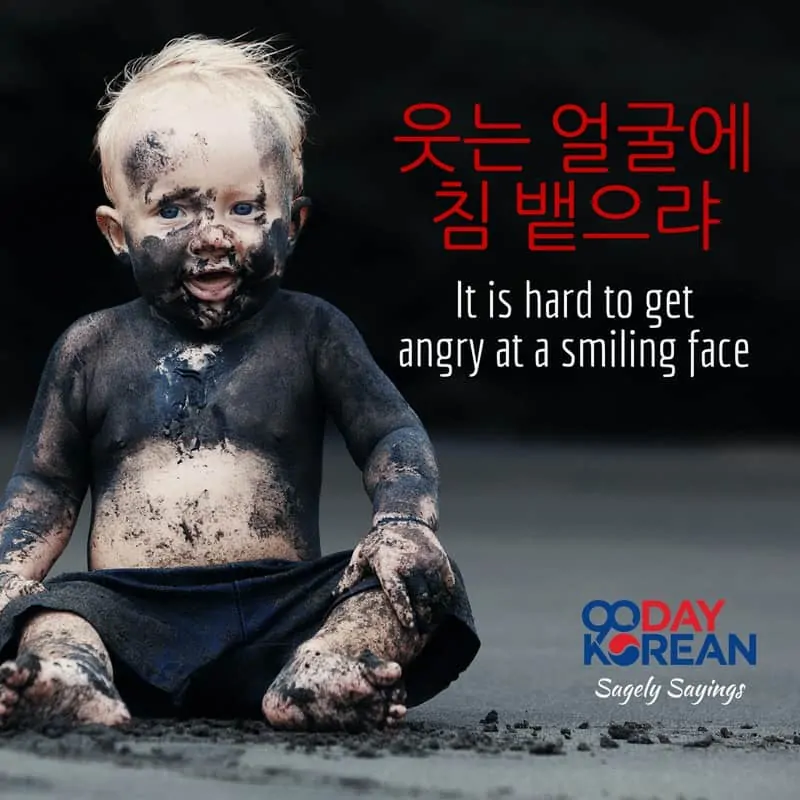
Meaning: It is hard to get angry at a smiling face
Literal Translation: You can't spit in a smiling face
10.
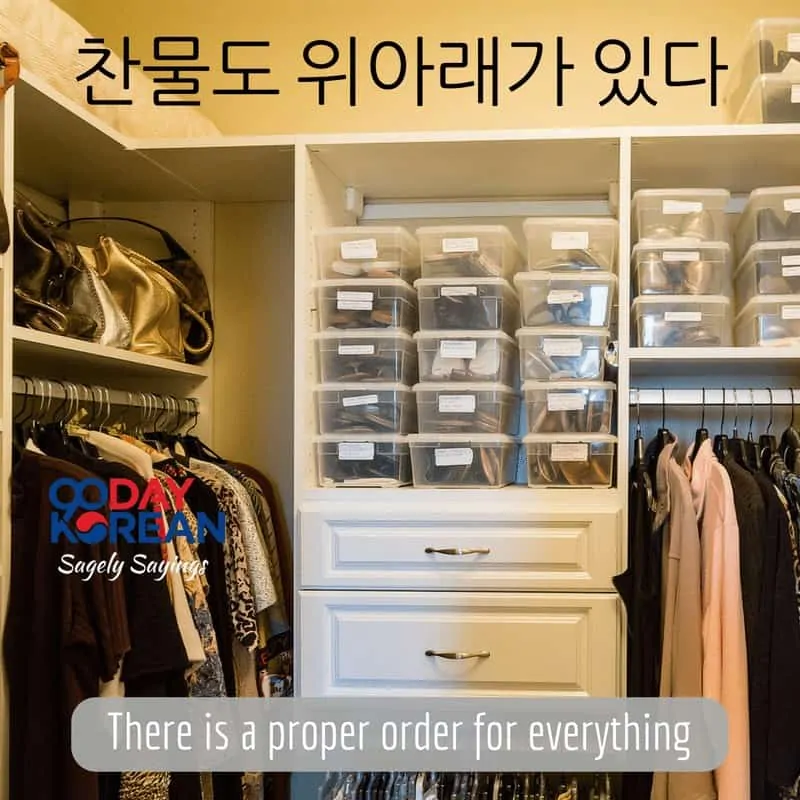
Meaning:There is a proper order for everything
Literal Translation: Cold water is at the top and bottom
11.

Meaning: You scratch where it itches
Literal Translation: Give a scratch to the itchy place
When to use it: This Korean proverb can be used when someone does something to satisfy your needs without asking for it. For example, imagine you just got done with a basketball game. You are very thirsty, and without asking, your friend gives you an ice-cold Powerade. 가려운 곳을 긁어 주다 (garyeoun goseul geulgeo juda)!
Keep proverbs like this handy when you get something unexpected.
12.

Meaning: Look before you leap
Literal Translation: First knock on the stone bridge before crossing
13.

Meaning: Keep your cool even in the face of despair
Literal Translation: Even though a tiger is biting you, if you gain consciousness, (you can) live
14.
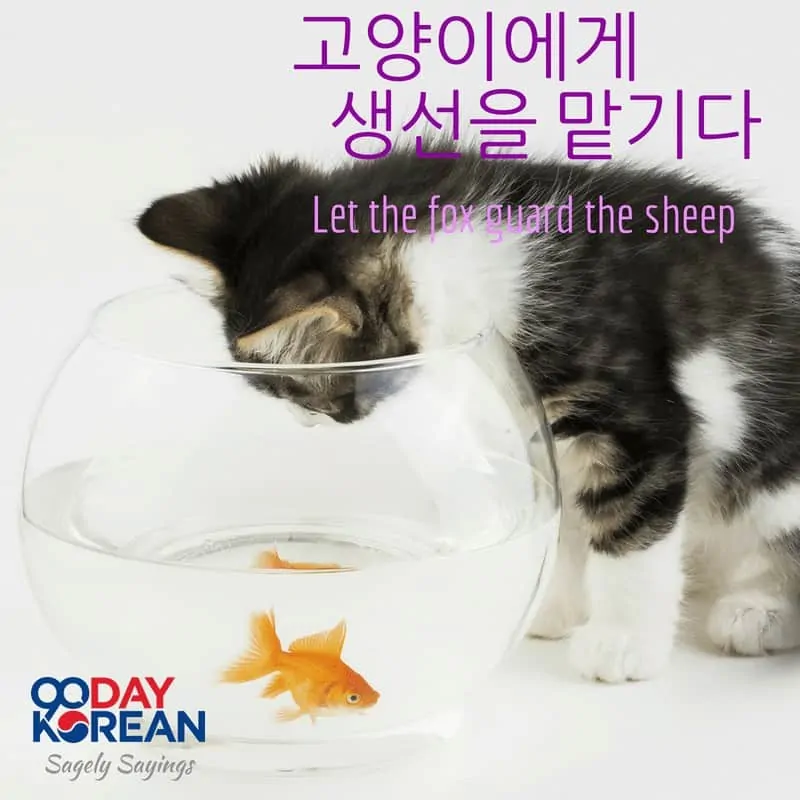
Meaning: Let the fox guard the sheep
Literal Translation: Entrust the fish to the cat
15.

Meaning: You reap what you sow
Literal Translation: A bean grows where you plant a bean, and a red bean grows where you plant a red bean
16.

Meaning: If you buy cheap, you waste your money
Literal Translation: Cheap things are dreg cakes (rice cakes made from remains of bean curd)
17.

Meaning:There is no shortcut to learning
Literal Translation: There is no shortcut to learning
18.
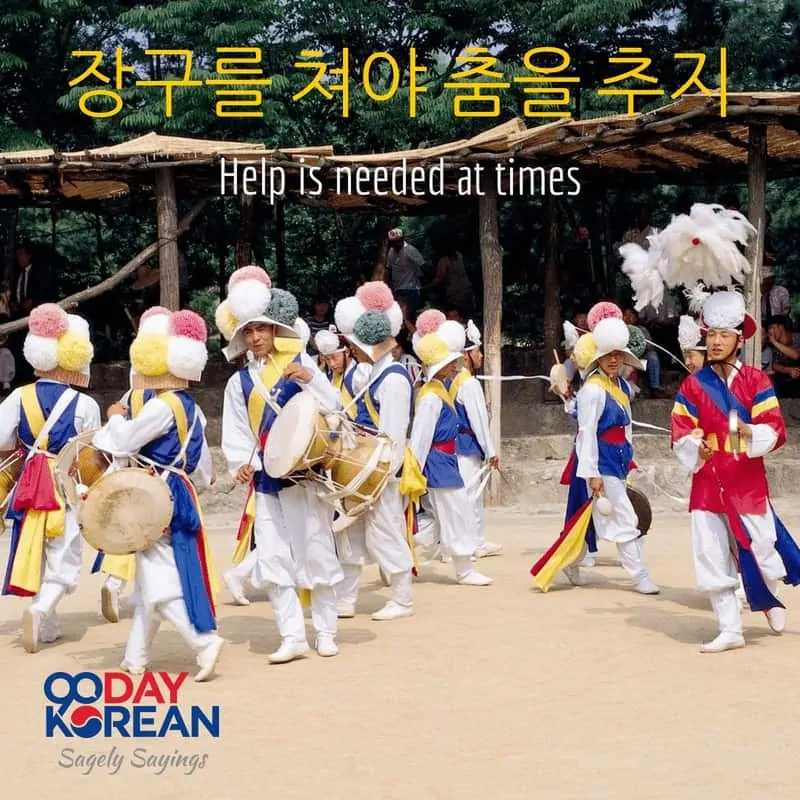
Meaning: Help is needed at times
Literal Translation: You can only dance when the jangu (drum) is played
19.

Meaning: No pain, no gain
Literal Translation: Delight comes at the end of difficulty
When to use it: You can use this proverb for someone going through a difficult time while working towards something worthwhile. It means that at the end of hardships comes happiness.
You could use this proverb if your sister is studying to take a test to get into medical school. Let's say she is halfway through the test prep course, and she wants to give up because it's so difficult. You encourage her to keep going by saying '고생 끝에 낙이 온다 (gosaeng kkeute nagi onda)!'
The English translation of the words is similar to what the proverb actually means.
20.
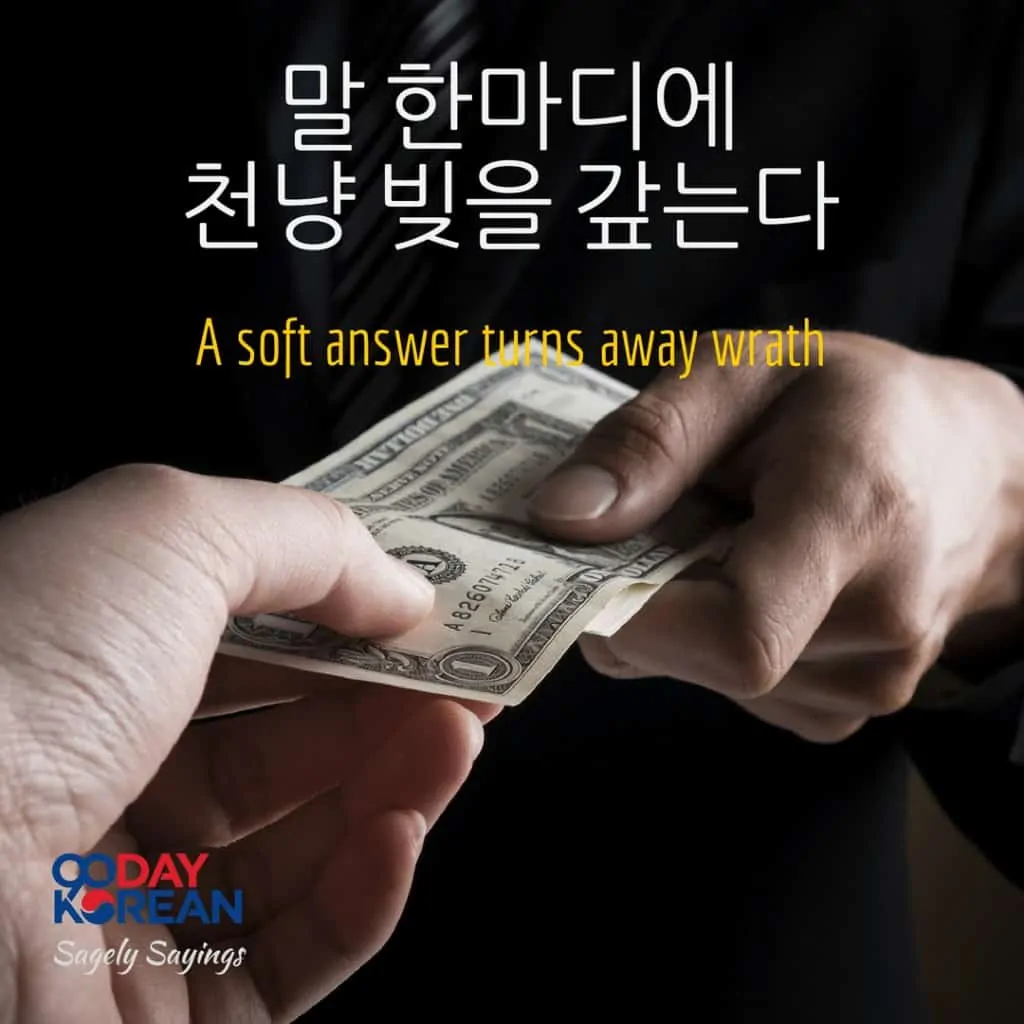
Meaning:A soft answer turns away wrath
Literal Translation: One word pays back a debt of a thousand nyang
21.
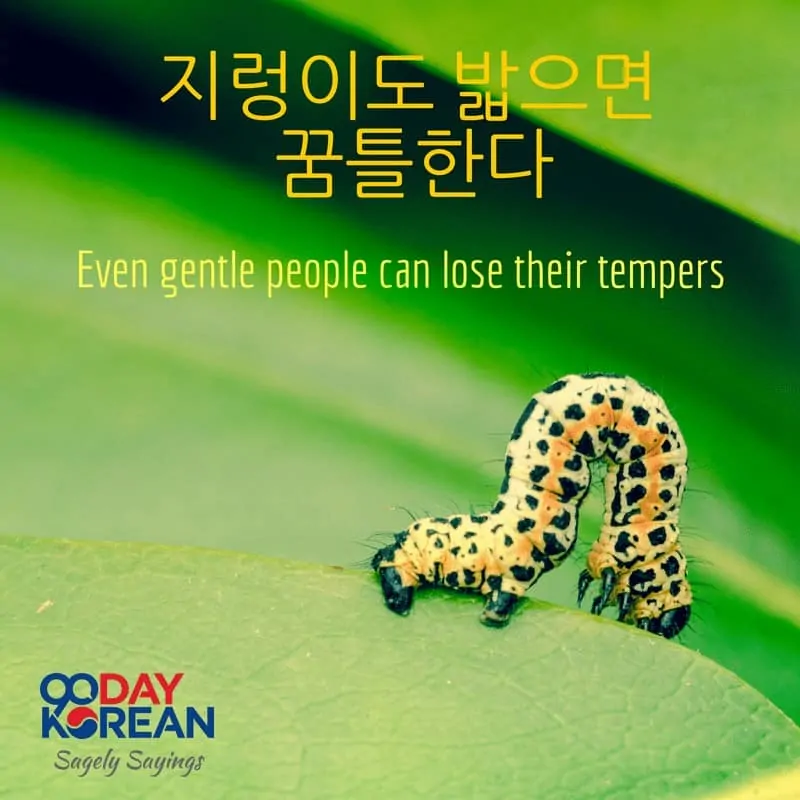
Meaning: Even gentle people can lose their tempers
Literal Translation: Even a worm will wiggle if you step on it
22.
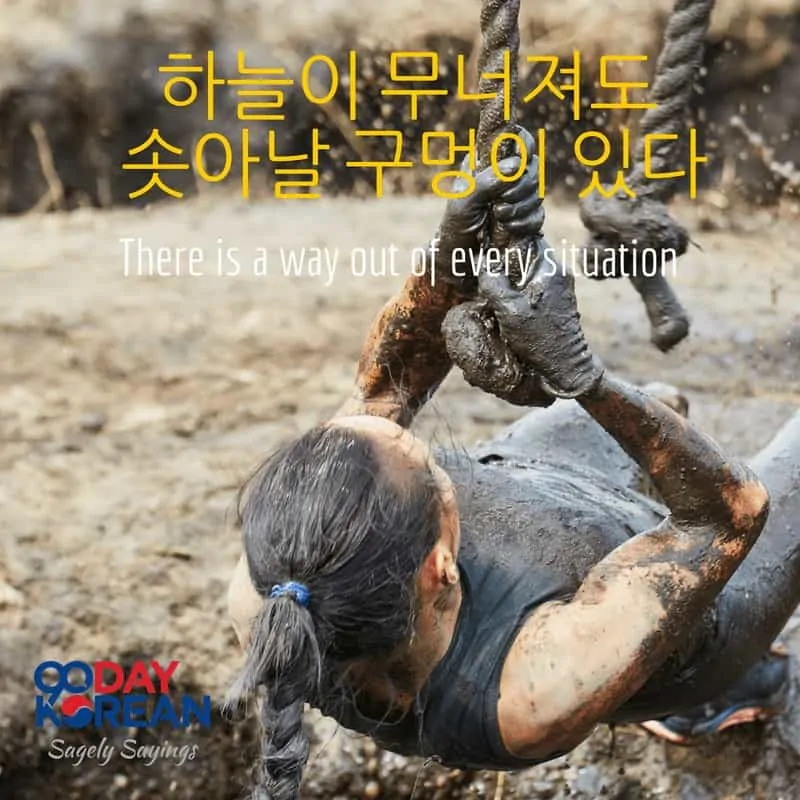
Meaning: There is a way out of every situation
Literal Translation: Even if the sky collapses, there is a hole to escape out of
23.

Meaning: Things are never where you want them
Literal Translation: When you want to find even dog dung to use as medicine, you can't find it
24.
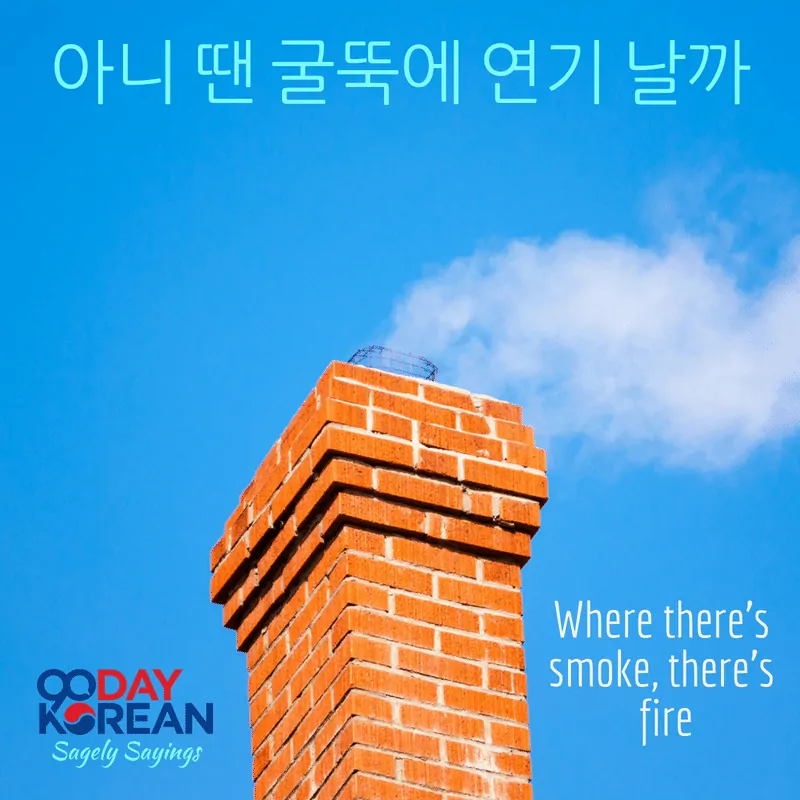
Meaning: Where there's smoke, there's fire
Literal Translation: Will smoke come out of a chimney if there is no fire?
25.

Meaning: What goes up must come down
Literal Translation: What goes up must come down
26.
Meaning: Hindsight is 20/20
Literal Translation: Fix the barn after losing the cow
Korean Sayings
1.

Meaning: Actions speak louder than words
Literal Translation: Don't just speak; put it into action
When to use it: You can use this saying in any situation when you want to motivate another to get something done. For example, a mother could use this to their school-aged child to get them to do their homework instead of just saying they'll do it later. The literal translation of words into English is similar to its actual meaning, so it is easy to understand.
2.
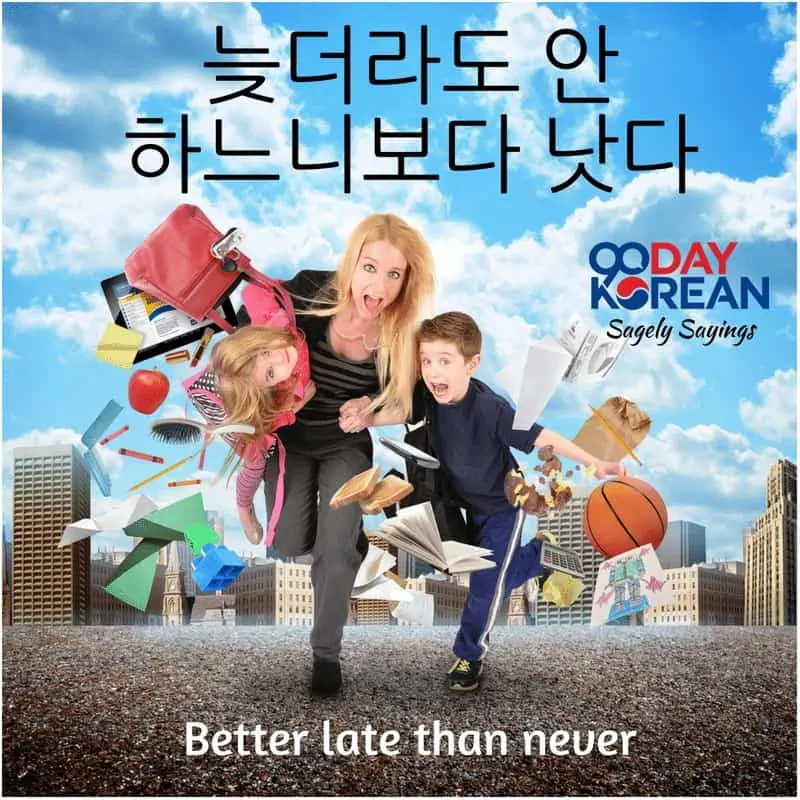
Meaning: Better late than never
Literal Translation: Late is better than not doing
When to use it: You can use this phrase in cases when you think it's better to do something late than never to arrive or happen, like arriving at an appointment.
Can't read Korean yet? Click here to learn for free in about 60 minutes!
3.

Meaning: Honest is the best policy
Literal Translation: Honesty is the best way
When to use it: You can use this saying to express to someone that telling the truth is the right thing to do. For example, you might use it with a girlfriend who caught her boyfriend skipping Korean class!
4.
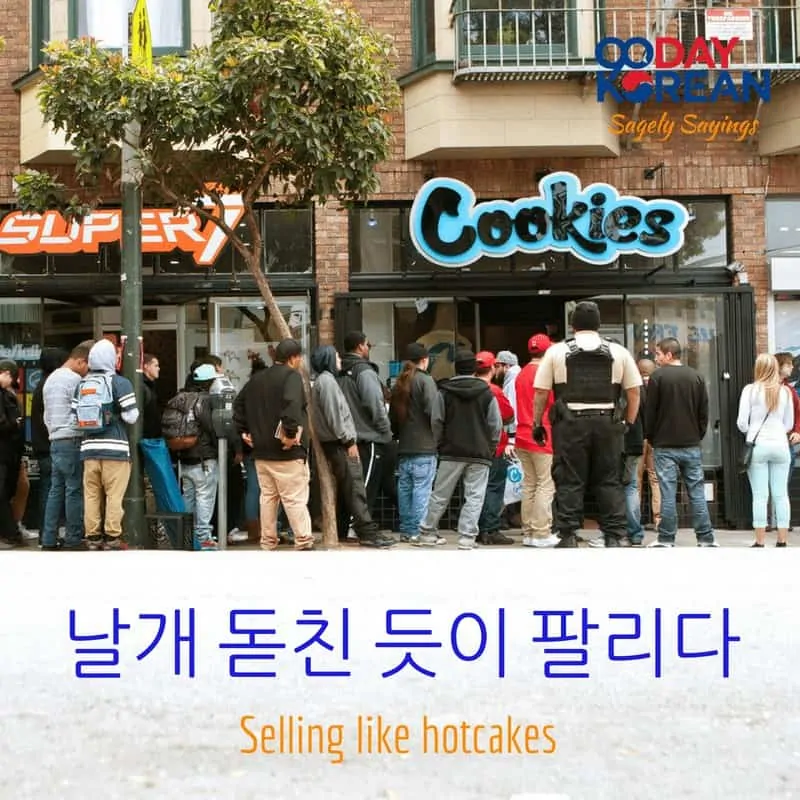
Meaning: Selling like hotcakes
Literal Translation:Selling as if they're flying away
When to use it: This is a Korean equivalent to "selling like hotcakes" and can be used to describe things that are selling really well, like umbrellas when it's raining or ice cream on a really hot day!
5.
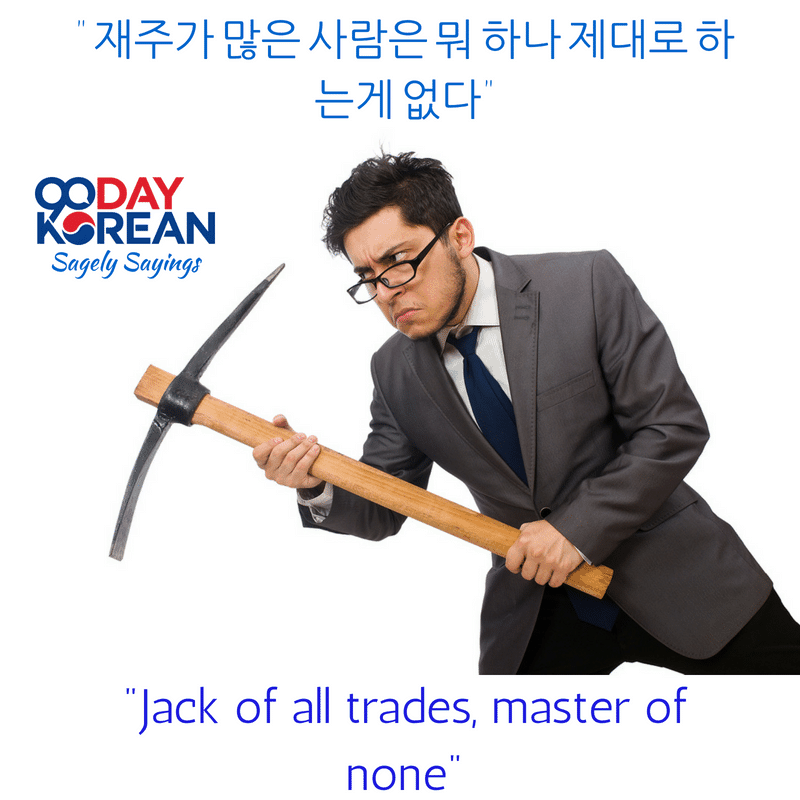
Meaning: Jack of all trades, master of none
Literal Translation: A person with many skills cannot do one properly
When to use it: Use it when referring to a person that is competent in many skills but never becomes an expert in any particular one because they are too busy learning skills to an adequate level.
6.

Meaning: An ounce of prevention is worth a pound of cure
Literal Translation: Prevention is better than a cure
When to use it:You can use it to suggest that it is better to avoid problems in the first place rather than fix them once they come up.
7.

Meaning: Fortune favors the brave
Literal Translation: The goddess of good fortune likes a person who has the courage
When to use it:It is commonly used to encourage people tobe brave and carry out their plans.For example, a friend may say it to another who doubts whether they should start their own business or open a shop.
8.

Meaning: One hour today is worth two tomorrow
Literal Translation: There is more worth in one hour today than in two hours tomorrow
When to use it, you can suggest that doing something immediately and taking action, even if it's not perfect, is better than procrastinating.
If you liked this list of proverbs, you might want to go here for some useful Korean phrases or common Korean words. These will be helpful if you want to learn Korean.
Head over here for some tips on how to speak Korean and learn Korean. Then you can integrate these proverbs and sayings into everyday conversations.
Which was your favorite? Which piece of wisdom could you apply to your own life at this time?
Let us know in the comments below!
Source: https://www.90daykorean.com/korean-proverbs-sayings/

0 Response to "Kpop Winter Fashion Korean Drama Funny Quotes"
Post a Comment